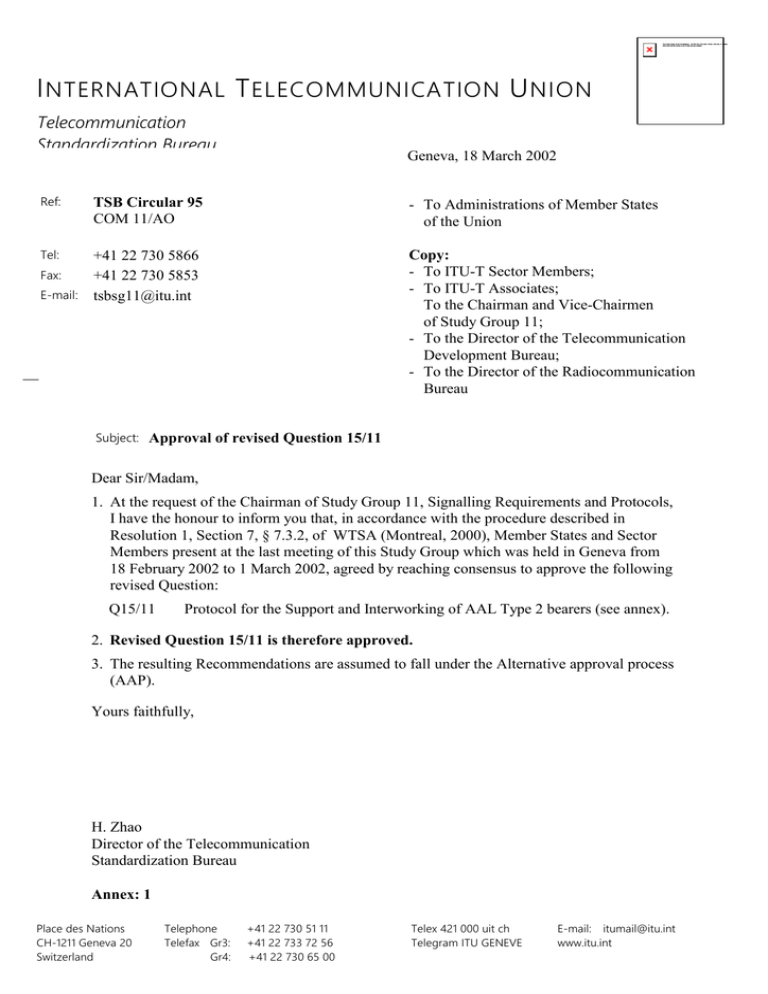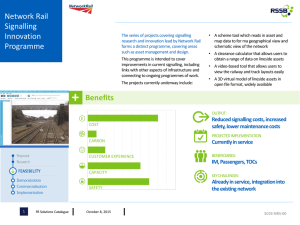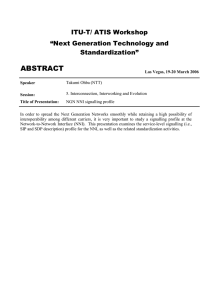I T U NTERNATIONAL
advertisement

I NTERNATIONAL T ELECOMMUNICATION U NION Telecommunication Standardization Bureau Geneva, 18 March 2002 Ref: TSB Circular 95 COM 11/AO - To Administrations of Member States of the Union Tel: +41 22 730 5866 +41 22 730 5853 tsbsg11@itu.int Copy: - To ITU-T Sector Members; - To ITU-T Associates; To the Chairman and Vice-Chairmen of Study Group 11; - To the Director of the Telecommunication Development Bureau; - To the Director of the Radiocommunication Bureau Fax: E-mail: Subject: Approval of revised Question 15/11 Dear Sir/Madam, 1. At the request of the Chairman of Study Group 11, Signalling Requirements and Protocols, I have the honour to inform you that, in accordance with the procedure described in Resolution 1, Section 7, § 7.3.2, of WTSA (Montreal, 2000), Member States and Sector Members present at the last meeting of this Study Group which was held in Geneva from 18 February 2002 to 1 March 2002, agreed by reaching consensus to approve the following revised Question: Q15/11 Protocol for the Support and Interworking of AAL Type 2 bearers (see annex). 2. Revised Question 15/11 is therefore approved. 3. The resulting Recommendations are assumed to fall under the Alternative approval process (AAP). Yours faithfully, H. Zhao Director of the Telecommunication Standardization Bureau Annex: 1 Place des Nations CH-1211 Geneva 20 Switzerland Telephone Telefax Gr3: Gr4: +41 22 730 51 11 +41 22 733 72 56 +41 22 730 65 00 Telex 421 000 uit ch Telegram ITU GENEVE E-mail: itumail@itu.int www.itu.int 2 ANNEX Question 15/11 - Protocol for the support and Interworking of AAL Type 2 bearers Reasons for the question The desire to support existing network services and their enhancements employing AAL type 2 bearer transport technology, will require the specification of bearer transport technology control protocols which support both fixed and mobile network applications. It is also required to develop solutions for interworking between AAL Type 2 signalling protocols and other signalling protocols controlling bearer technologies, such as IP. Question What new recommendations and what enhancements to existing recommendations are required to support the evolution of AAL type 2 bearer transport control protocols? Task objectives The major focus of this question is to develop AAL type 2 bearer transport control protocol recommendations to be used to support both fixed and mobile network based services. The task objectives for the question are: 1) Develop the signalling protocol recommendations for extension of AAL type 2-bearer control signalling protocols in response to the requirements from the question responsible for the Signalling requirements for the support of Bearer Independent Call Control Applications. 2) Develop signalling protocol interworking recommendations for interworking between AAL Type 2 bearers and other bearer technologies. 3) Participate in the development of any interworking supplements between AAL type 2 signalling and high layer signalling protocols. 4) Produce the necessary information for Protocol Implementation Conformance Statements (PICS) with the support of the testing question (Question 14/11), if required. To assist the test generation the extensive usage of formal description techniques (e.g. SDL, ASN.1) is encouraged. Estimated completion: Ongoing. The outputs of this question will be recorded as ITU-T recommendations. For task items 1, 2 and 3, completion dates will be set by requirements from the question responsible for the Signalling requirements for the support of Bearer Independent Call Control Applications. Relationships The development of these recommendations will require close coordination activities with: • Requirements from the question responsible for the Signalling requirements for the support of Bearer Independent Call Control Applications. • High Layer Signalling protocol questions (e.g. BICC). • User Plane related questions (e.g. 5/13). • Signalling transport protocol questions, Integrated call and bearer protocol questions (e.g. DSS 1, DSS 2, ISUP, B-ISUP, H.323). • External organisations, such as IETF, ETSI (3GPP) and TIA (3GPP2).

